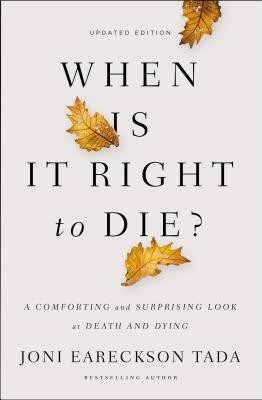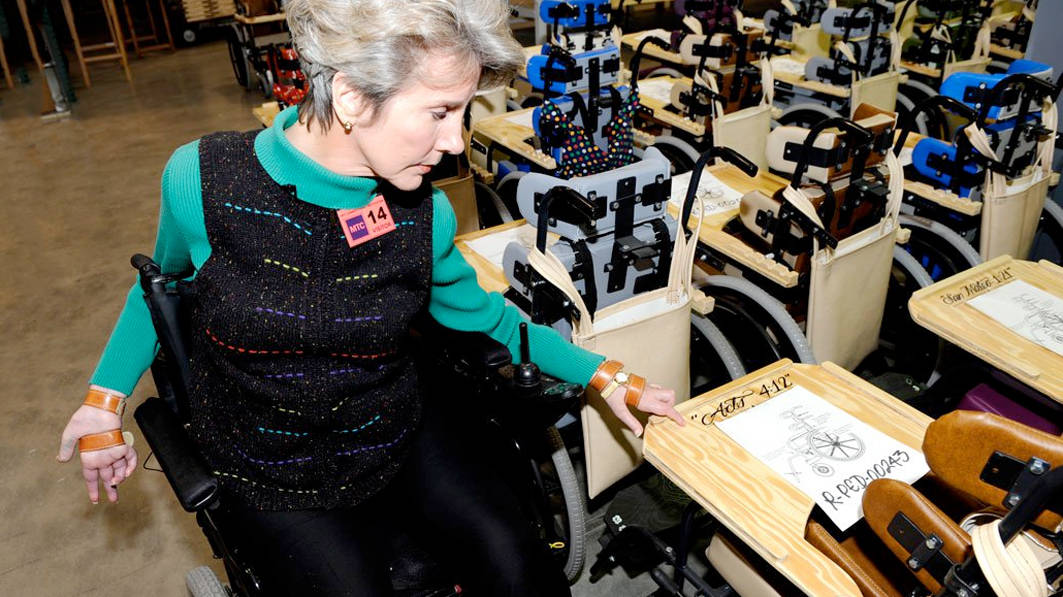More and more people who have disabilities or are terminally ill are choosing assisted suicide. Joni Eareckson Tada knows what it means to wrestle with this issue. For the last 50 years, she has been confined to a wheelchair and struggled against her own paralysis. She has sat by the bedside of her dying father, asking, Why shouldn’t we spare loved ones pain if we can? She knows that behind every right-to-die situation is a real person with a real family, longing for hope, answers and a release from suffering.
In her book When Is It Right to Die? Joni shares her own journey of choosing life-giving alternatives to assisted suicide. She also invites readers into the stories of other who are wrestling with the heartache of end-of-life questions. Stories about people like Kim.
______________________________________
Whenever I begin to think my efforts don’t count – or even when my quadriplegia and wheelchair feel like too much to handle – I think of a young woman named Kim.
I first learned about Kim when an elder from her church in Pennsylvania called to ask if I would contact her with a few words of encouragement.
“Kim is a brilliant 26-year-old Christian woman who has always been active in our church,” he said, “but last year she contracted a motor-neuron disease and now must stay in bed. She can hardly move and must be fed with a feeding tube.”
The elder paused for a moment and then added, “Kim is very depressed, and she’s wondering if her life is worth living anymore.”
I telephoned Kim right away. Her mother tucked the receiver under her ear. Her breathing was so faint that I could hardly hear Kim’s voice. We discussed many things, including our favorite parts of the Bible, the subject of heaven and prayer. Finally, Kim said with great labor, “Joni, they want to give me a ventilator to help me breathe, but I don’t know whether I want one. I’m so tired. Do you think I should go on a ventilator?”
I was speechless. I took a deep breath, whispered a prayer, and replied, “Kim, there are a lot of things to consider, not the least of which is that your decision will affect many people around you. But of the two choices facing you, I think there’s a better one.”
I then proceeded to share with her a simple but powerful Bible verse that has encouraged and guided me through the toughest of times in my 50 years of quadriplegia.
Second Peter 3:8 reads, “Do not forget this one thing, dear friends: With the Lord a day is like a thousand years, and a thousand years are like a day.”
We all know the old adage that God looks at the last 2,000 years as a couple of days gone by, I told her, but what about the other half of the verse? The part about seeing each day as a thousand years? It’s like divine arithmetic. It doesn’t take a rocket scientist to figure out God’s mathematical formula. If we see each day as comparable to a millennium in eternity, then each 24 hours is chock full of opportunities to invest in a thousand years’ worth of eternity. Each day God gives us the precious gift of hours to invest in the lives of others – investments that will have eternal repercussions for us and them.
Kim perked up at this idea. “But I’m in bed. I can’t go anywhere or do anything. How can my life count in this condition?”
This is what I told her: “First, Kim, you can pray. No matter how feeble or fainthearted your prayers may seem, they have very special power with God. Psalm 10:17 reads, ‘You, Lord, hear the desire of the afflicted; you encourage them, and you listen to their cry.’ The Lord cups His ear to listen when someone like you prays, someone who is enduring great affliction. He bends over backward when people offer Him a sacrifice of praise. God is going to use your intercessions to shake the lives of everyone around you.”
That intrigued her. “And your obedience counts for eternity. Now is your chance to stretch your soul’s capacity for God, Kim. Your patience and endurance will resound to more glory to God than you can possibly appreciate right now. As the apostle Paul writes in Romans 8:18, ‘I consider that our present sufferings are not worth comparing with the glory that will be revealed in us.’ If you keep a godly response, then it must multiply out to at least 558 years of eternal benefit to you and glory to God!”
She laughed, and I shared more. I encouraged her to think of the impact her patience and endurance would have on others around her, like her mom and dad. Philippians 2:4 tells us to always look out for the interests of others before our own. We are always called to think of others, no matter how difficult our circumstances.
This young woman became a living example of 2 Corinthians 4:16–18: “Therefore we do not lose heart. Though outwardly we are wasting away, yet inwardly we are being renewed day by day. For our light and momentary troubles are achieving for us an eternal glory that far outweighs them all. So we fix our eyes not on what is seen, but on what is unseen, since what is seen is temporary, but what is unseen is eternal.”
Kim ended up living another month and a half after our conversation on the phone. But as her mother told me later, those 45 days – she looked at them as 45,000 years – were some of the most meaningful and important weeks she ever lived.
If Kim made the most of every opportunity to reflect Jesus Christ during those difficult last days of her life, you and I can reflect Jesus as well.
Perhaps you’re not facing the decision to accept a ventilator or refuse it. You may not be dying, debilitated or terminally ill. But still, you’d give anything to feel the peace Kim found. Trouble is, you still might be tempted to believe the lie that peace is found by prematurely ending your life.
True, you may feel that no one seems to care. And maybe not a soul does care! You may feel as though life is not expecting a single thing from you, and you simply cannot live with depression. Sadly, you are even willing to stake your life on the belief that nothing awaits you after death.
If so, you need peace! But remember, peace of mind comes not in the form of a death sentence, but through people. There is a Person who cares about you, even if no one else does. He calls himself the Prince of Peace. And it is His perspective that really matters.

When Is It Right to Die?
More and more people who are terminally ill are choosing assisted suicide. When is it Right to Die? offers a different path with alternatives of hope, compassion, and death with real dignity.
Joni Eareckson Tada knows what it means to wrestle with this issue and to wish for a painless solution.




















